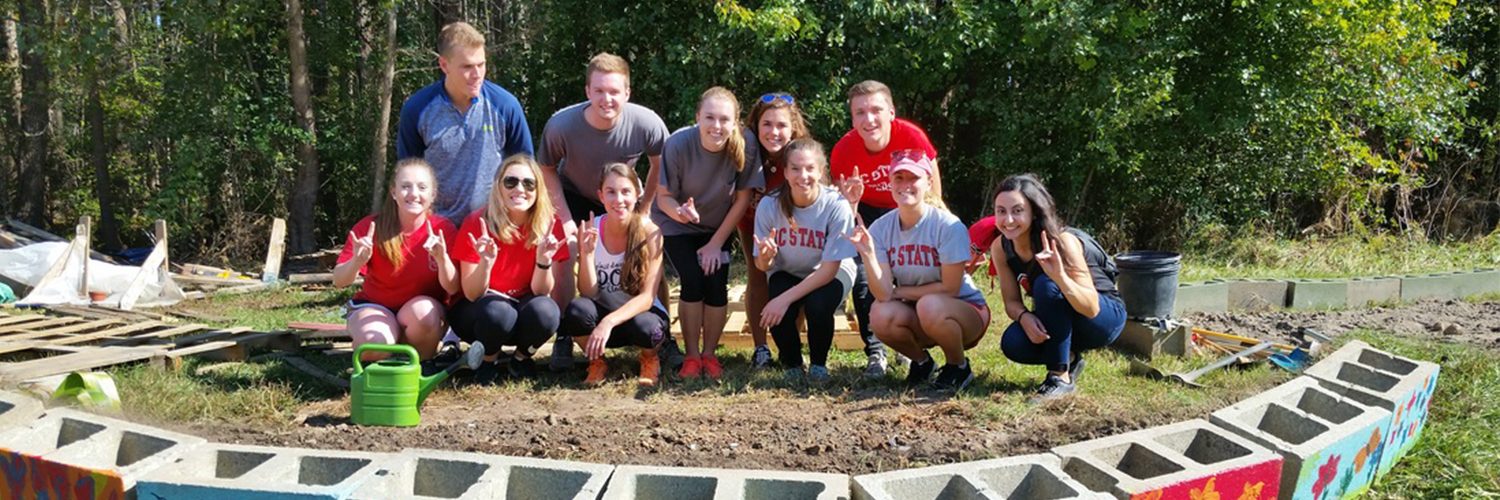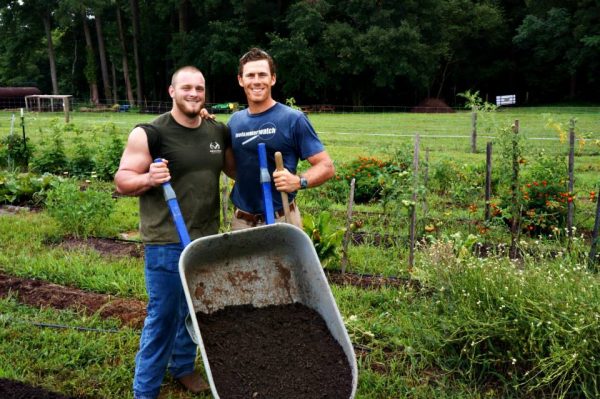
Get Involved
.
Get Involved Beyond the Classroom
.
A key aspect of the Agroecology and Sustainable Food Systems major is to learn and engage with real-world food system issues and to encourage learning beyond the classroom. Here at NC State there are many opportunities, student clubs, campus organizations, and community groups focused on agroecology and food systems issues that students can become involved in and learn from. Below are some of the main ones.
.

Agroecology students work together with NC State Dining at the Agroecology Education Farm learning hands-on how to produce sustainable crops that end up back on campus in the cafeterias. |
Agroecology Education Farm
.
Located about 10 minutes from campus, the Agroecology Education Farm is the main “learning lab” for the Agroecology program and classes. It’s the place (and community) where students can learn hands-on about sustainable and organic agriculture production throughout the year and then eat what they grow in the NC State Dining halls back on campus. Students can volunteer, attend (or lead) a workshop, organize a visit/tour for a club, or even work at the farm.
- Interested in volunteering or working at the Agroecology Education Farm? Each year the Agroecology Education Farm hires 1-3 student interns. Visit the Agroecology Education Farm website for more information.
.
Join a Student Club Related to Agroecology at NC State
.
- Beekeepers Club The Beekeepers Club at NC State is all things bees! Learn about amazing bee facts, beekeeping basics, and connect with fellow bee enthusiasts. Come visit the club hives at the Agroecology Education Farm and our own farm manger serves as the adviser for this club.
- Campus Farmers’ Market Student Club Started by Agroecology students, the student-run Campus Farmers’ Market brings local producers/ vendors on the Brickyard every Wed (11am – 3pm) during the semester to create awareness about our local NC foods and food system issues.
- Culinary Horticulture Club Student club focused on the history, sociology, science, and culinary attributes of horticultural crops.
- Horticulture Club Love plants?? Join fellow plant enthusiasts in the Horticulture club for various plant learning experiences through speakers, field trips, tours, and other opportunities.
- SOUL Garden Located at Centennial campus of NC State, the SOUL Garden is a student -led organic garden.
- Wolfpack Environmental Student Association (WESA) Learn about current environmental issues, find out ways to be to active in events on campus and in the community, and share ideas for issues cross-cutting food, agriculture and the environment.
.
More Campus Groups to Connect with
.
- EcoVillage A living and learning village on campus that allows students to explore their interests in environmental conservation, energy, sustainable industry and business, and agriculture through community service, field trips, social events and educational programming.
- Feed the Pack- a Community Food Pantry at NC State Feed the Pack is a on-campus, NC State community-based initiative to combat the food insecurity experienced by members of our own Wolfpack family.
- NC State Dining and Sustainability Find about NC State Dining sustainability efforts in the dining halls and food across campus from purchasing local NC food, to composting food wastes, recycling cooking oil and more.
- NC State Stewards NC State Stewards promote sustainable practices among their peers and the greater campus community. Stewards are role models and campus leaders, inspiring others to consider the impact that personal decisions have on the environment, community and the future.
- University Sustainability Office Find out about sustainability related events and programs across campus, how to become involved, sustainability grants, awards and more.
.
Engage with Community Organizations
.
Community engagement is core to the Agroecology and Sustainable Food Systems program and at NC State. Below are community partners near campus that students visit and engage with through service learning opportunities in various agroecology courses or that students can volunteer with related to food security, community gardening and education.
- InterFaith Food Shuttle (IFFS)
- Well-Fed Community Garden
- Alliance Medical Ministry Community Garden
- Longview School Garden and FFA Chapter
- AB Combs Elementary School Garden
